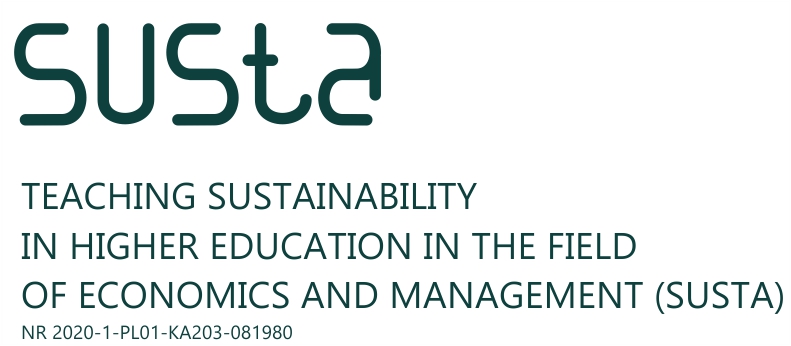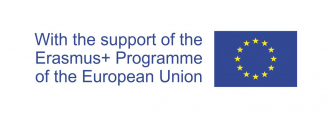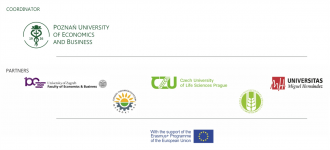
Teaching Sustainability in Higher Education in the Field of Economics and Management
Teaching Sustainability in Higher Education in the Field of Economics and Management (acronym: SUSTA) is a project with a total duration of 3 years.
The main goal of the project was to develop an education program in the field of sustainable development and sustainable consumption and to increase the knowledge, awareness, and involvement of business students in environmental issues. The implementation of tasks financed under the Erasmus + call 2020 started on December 31, 2020, and ended on December 30, 2023. The project was carried out in cooperation of six partner universities: Poznań University of Economics and Business (Poland); Czech University of Life Sciences Prague (Czech Republic); Miguel Hernandez University of Elche (Spain); Slovak University of Agriculture in Nitra (Slovakia); University of Szeged (Hungary); University of Zagreb (Croatia)
SUSTA project website:
Regarding the accomplished outputs of this project:
Intellectual Output 1 was dedicated to prepare very strong basis for developing all next intellectual outputs. The aim of IO1 was to provide a research-based background for the development of syllabuses and teaching materials on sustainability. IO1 focused on two aspects:
- The analysis of students awareness on sustainability issues and also their needs and expectations of learning sustainability (task 1.1).
- Desk research on existing courses on sustainability in higher education in partner's countries (task 1.2).
Task 1.1: The idea of this task was to carry out questionnaire research among students at the partner universities. As a first step of task 1.1, a questionnaire in English was created. The questionnaire was devided into 2 gropus of statements: awareness and needs. The part of the questionnaire relating to sustainability awareness contained 18 statements, while the part of the questionnaire relating to studying needs consisted of 15 statements. For each statement, the participants responded on a 7-point Likert scale (1 - strongly disagree, 7 - strongly agree). The questionnaire design was neccessary to identify the issues of sustainability matter that students consider important in their countries (issues) and also to find out their studying needs.
Then, the questionnaire was translated into each Partner national language. Next the survey was distributed among students using the GoogleForms application in each Partner country. Target group were students, aged 19-25, studing at bacholor and master levels, mostly at business studies.
All project partners agreed that, in order to increase the quality of the project results, it would be beneficial to increase the size of the research sample in relation to that indicated in the project proposal. Therefore all participants reached a greater sample size than the required 100 participants per Partner (N=100). As a result a total of 1716 (N=1716) correctly completed questionnaires were collected. This is a significant increase (almost three times) on the 600 (N=600) respondents planned in the project proposal.
When it comes to research results students from 4 out 6 Partner universities, indicated "Climate change" as the biggest issue (Poland, the Czech Republic, Spain, Slovakia). On the other hand students from Croatia indicated "Functioning of public institutions" as the main issue, and students from Hungary "Income inequality". From the average of all countries "Sanitation conditions" was indicated as the less significant issue. As far as studying needs, on average, students from all countries mentioned their high need to be taught about "Responsible consumption". Students from Poland and Croatia also mentioned that they mostly need to be taught about "Standard working conditions". On average, "public transportation" was indicated as the least needed subject for students to learn about.
One of the aims of the survey was to finding out if the issues that students consider important are associated with their studying needs. In order to do so, a regression analysis was carried out (using R Studio). The regression analysis allow to investigate if the “Issues” can explain the “Studying needs” of students. On average, indicated "issues" can serve as predictors of students' Studying needs’. Out of 16 "needs", only 5 are not directly connected with the indicated "issues".
Task 1.2: The desk research on the existing education offer of higher instutions in partners' countries is the basis to indentify the education gap and good practices in teaching sustainability. The aim of this task was to check the existing offer of leading universities in partners' countries connected with the sustainability.
The research focused on courses on sustainability that explicitly mention one of the following terms in their name/title: „sustainability”, or „sustainable. Different aspects of each course were analyzed: thecontent of course, education level, language of teaching, number of teaching hours, number of ECTS points, expected learning outcomes, and teaching methods. In total, over 90 courses were identified that met the requirements. In half of the countries, most of these courses were delivered at the master's level (Croatia, Czech Republic, Slovakia). In all countries, most sustainability courses were taught in the national languages.
After completing tasks 1.1 and 1.2, a gap was found. None of the universities analysed in the desk research offers a course on sustainability that addresses all the identified research needs specified in Task 1.1. Most of the analysed courses had a rather narrow focus, e.g. only on sustainable logistics, sustainable urban management, etc. The results of the IO1 study pointed to the need for a course on sustainability in the form that was proposed in the SUSTA project.
IO1 is available at the following page: https://ue.poznan.pl/pobierz/ellDVFpaUF5UXXgJFgMIDgcBAwg/
Based on the results of Intellectual Output 1 (report on awareness and needs of students in a field of sustainability issues and desk research of existing courses on sustainability) the syllabus of teaching course on sustainability has been designed. As it was planned work on Intellectual Output 2 was divided into 2 tasks.
Task 2.1: Dictionary of skills and competences of sustainability
Based on the results of IO1, the dictionary of required skills and competences regarding the sustainability was developed. It describes the profile of a student and future manager which is aware of running a business in sustainable manner, who has skills and competences to manage the business with respect to environmental, social and economic cohension. According to publication of "Krajowy Standard Kompetencji Zawodowych" launched by Ministerstwo Pracy i Polityki Społecznej (Ministry of Labour and Social Policy) we have identified 5 key competences that should be achieved during the course on sustainability. Each cometence consists of knowlegde necessary to gain (7-10 areas of knowledge) and skills needed to be developed (7-10 skills).
As a result, within IO2 the foillowing competences have been identified:
- Competence 1: Recognition and Critical Analysis of Sustainable Development Goals in Modern Management (10 skills/10 areas of knowledge)
- Competence 2: Recognition of Innovative Approaches in Sustainable Industry and Sustainable Consumption (10 skills/8 areas of knowledge)
- Competence 3: Development of Sustainable Business Strategies and Processes (9 skills/10 areas of knowledge)
- Competence 4: Implementation of Green Supply Chains And Business Logistics (10 skills/10 areas of knowledge)
- Competence 5: Budgeting, Evaluating, Reporting And Auditing In Implementation Of Sustainable Business Practices (10 skills/7 areas of knowledge)
Task 2.2. Extended syllabus of teaching course on sustainability
This extended syllabus provides the teaching content for a course on sustainability. This course is designed for university students at undergraduate/master's level studying the programme of business management, innovation management, entrepreneurship and similar. The course covers 30 teaching hours and 5 ECTS credits. In the sylabus, there are 5 main teaching modules:
- Introduction to the Sustainable Development Goals in Modern Management (6 units)
- Innovative Approaches to Sustainable Consumption (4 units)
- Sustainable Business Strategies and Processes (5 units)
- Green Supply Chains and Business Logistics (4 units)
- Disclosures in Sustainable Business Practices (4 units)
IO2 is available at the following page: https://ue.poznan.pl/pobierz/ellDVFpQWVJSV34JFgMIDgcBAwg/
Within Intellectual Output 3 the learning materials on sustainability for students in the form of e-book has been prepared. E-book as a form of textbook is innovation as still most of textbooks are published in hard copies. A textbook for students with the knowledge which is to share during the course on sustainability has been produced. The-book is dedicated to business students participating in the course on sustainability. Its aim is to fulfill students needs of getting all the required knowledge and information in one source. This e-book covers the conent of whole course on sustainability. It is divided into parts and chapters according to syllabus (IO2).
The e-book tilted: ‘SUSTAINABILITY. E-BOOK FOR STUDENTS’ has been created by an international team of twenty one authors. It is divided into five chapters and twenty four subchapters. It has been reviewed by an independent reviewer and published by ‘Bogucki Wydawnictwo Naukowe’ publishing house. It has a DOI number assigned (https://doi.org/10.12657/978-83-7986-488-1) and it is 491 page long.
As it was mentioned, the e-book is divided into five chapters: Introduction to Sustainability, Macroeconomics Approach to Sustainability, Sustainable Business Strategies, Sustainable Consumer Behavior, and Disclosures in Sustainable Business Practices. It starts with a comprehensive introduction to sustaianablity (Chapter 1). Among other things, the chapter addresses such issues as: climate change, resource usage, and proinvironmental Policy. The book also provides a macroeconomic approach to sustainability (chapter 2), examining the economic and social dimensions of sustainability and their inter-linkages. It also covers sustainable business strategies (Chapter 3), which will help students understand how companies can undertake sustainable activities such introducing CSR principles or creating green supply chains. On the other hand, reprehensible practices such as greenwashing and social washing are also pointed out. The fourth chapter focuses on sustainable consumer behavior, examining sustainable consumption patterns, minimalizm and slow life. The last chapter (Chapter 5) explores the issue of disclosures in sustainable business practices, examining the various standards and guidelines that companies must follow when reporting on their sustainability performance.
All subchapters are structured as follows: annotation, background, discussion questions, and tasks for students, as well as further reading. The material covered is based on the latest research and best practices in sustainability, and it has been carefully selected to provide students with a solid foundation of knowledge.
It should give a possitive impact both on students from partners' universities as they are geting easy and free-of-charge access to textbook and on all other students, managers, employees or any other citizens who are interested in topic of sustainability. The open and free of charge access to this e-book gives also a potential to make this IO widely used also by teachres, trainers and educators also outside of the partnership if they wish to implement topics regarding the sustainability into their education practices.
The e-book is open source one, possible to download for free from the following webpage: https://ue.poznan.pl/pobierz/ellDVFtQWVJSVnMJFgMIDgcBAwg/
To make learning process as effective as possible, different forms of education are needed. One of them is case study, the method which helps student to imagine the real word situation, difficulty of managerial decisions, to analyse possible decisions with their advantages and dissadvantages and to recommend the best solutions. To answer these needs, the collection of case studies on susatinability has been prepared as Intellectual Output 4. The collection describes a real world examples of managing companies in sustainable manner, examples of problems and challenges which face companies, employees and society regarding a problem of environmenal, social and economic cohension.
The collection is titled: ‘SUSTAINABILITY. CASE STUDIES E-BOOK’. It is edited by three SUSTA Project members: David B. Lopez Lluch, Bartłomiej Pierański and Blaźenka Kneźewić. However, there are twenty four authors of all case studies in total. The collection is divided into four chapters. All togheter there are twenty four case studies. It has been reviewed by two independent reviewers and published by University of Zagreb, Faculty of Economics and Business. It has a DOI number assigned (https://doi.org/10.22598/susta ) and it is 318 page long.
The book begins with a theoretical introduction on, among other things: the nature of case studies, the principles of their production and their use in classes with students. The case studies are divided by economic sectors. Consequently, in the collection, all case studies are divided into four chapters: Sustainability of the Agricultural Sector (6 case studies), Sustainability of the Food Sector (6 case studies), Sustainability of the Public Sector (9 case studies) and Sustainability of the Distribution Sector (3 case studies).
Case studies are structured as follows: introduction, problem description and questions. In order to make the collection of case studies useful for as many students as possible, the questions were divided into two groups where this was justified: 'Questions for undergraduate students' and 'Questions for postgraduate students'. The questions in the second group are more difficult and require a broader range of knowledge in areas such as management and economics.
Students as target group are able to use them both during courses on sustainability and for their own purspose of learning. We are convinced that pubslishing case studies online makes this IO more visual and potentially transferable also to other teachers, trainers and educators out of the partnership who are interested in sustainability.
Collection of case studies are available free of charge at the following webpage: https://ue.poznan.pl/pobierz/ellDVFtaUF5UXH0JFgMIDgcBAwg/
E-learning is more and more common tool used in education as it helps to develop skills and knowledge regardless the physical presence at face-to-face lectures. This form of education is interesting both for students who normally participate in face-to-face classes but who miss some classes and for audience who does not participate in face-to-face classes. E-learning let students to follow the course in the most suitable time and place.
That is why videos of the course on sustainability content have been prepared as Intellectual Output 5 of SUSTA Project. The videos was recorded during summer course on sustainability (learning activity for students). The recorded lectures were delivered by co-authors of the e-book (IO3). They lectured on those chapters of the e-book they had authored. The assumption was that, when giving a lecture on a given topic, they would check whether it was interesting enough for the students and, based on this, decide on any modifications to the e-book. We were also convinced that delivering lectures in front of real students made them more realistic, dynamic and interesting than recording them without an audience. Therefore, we recorded the videos not in a recording studio, but in a real teaching context.
In addition, in order to involve the students more in the testing of the case studies, they were asked to prepare a presentation on a shop of their choice from the alternative retail formats. The presentations were prepared under the supervision of academic teachers (co-authors of the e-book and the collection of case studies). During the last day of the summer course, students presented their findings. Student presentations were recorded.
As a result, during the summer course in Prague more than 30 teaching hours have been recorded. When producing the films, with a view to their quality, 25 films (20 lectures and 5 students presentations) and were uploaded to the project's YT channel.
The videos are posted on the YT channel of the SUSTA project:
https://www.youtube.com/channel/UCjJXlVTR_OPn7vhv2kShgZg







